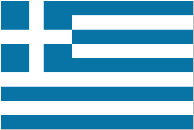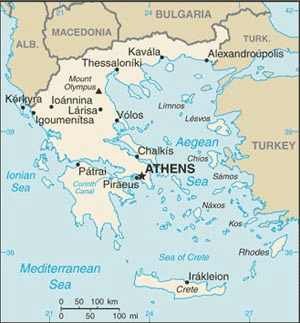Table of Contents
| Location and Size | Credit and Collections |
| Government | Risk Assessment |
| Legal System | Business Climate |
| People | Business Protocol |
| Economy | |
| Comparative Indicators |
12345
Location and Size
Greece is located in Southern Europe, bordering the Aegean, Ionian and Mediterranean Seas between Albania and Turkey. It is approximately the size of the US state of Alabama — area: 131,957 sq. km. (51,146 sq. mi.)
Government
Parliamentary republic with three branches:
- Executive: President Ekaterni Sakellaropoulou (since 13 March, 2020), head of state; Prime Minister Kyriakos MITSOTAKIS (since 9 July 2019), head of government.
- Legislative: 300-seat unicameral Parliament
- Judicial: Supreme, Civil and Criminal Courts
Legal System
Greece’s legal system is based on codified Roman law. The judiciary is divided into civil, criminal, and administrative courts. Greece has accepted compulsory International Court of Justice (ICJ) jurisdiction.
People
- Population: 10,533,871 (2022 est.)
- Population growth rate: 2.43% (2022 est.)
- Languages: Greek, English, French
- Literacy: 97.9% (2022)
- Ethnic Make-up: Greek 91.6%, Albanian 4.4%, other 4%
- Religions: Greek Orthodox 81-90%, Muslim 2%, other 3%, None 4-15%
Economy
Greece has a capitalist economy with a public sector accounting for about 40% of GDP and with per capita GDP about two-thirds that of the leading euro-zone economies. Tourism provides 18% of GDP. Immigrants make up nearly one-fifth of the work force, mainly in agricultural and unskilled jobs. Greece is a major beneficiary of EU aid, equal to about 3.3% of annual GDP.
- Currency: Euro (EUR)
- Leading Markets (2022): Italy 10.6%, Germany 7.1%, Turkey 6.8%, Cyprus 6.5%, Bulgaria 4.9%, Lebanon 4.3%
- Leading Exports – Commodities: Food and beverages, manufactured goods, petroleum products, chemicals, textiles
- Leading Suppliers (2022): Germany 10.4%, Italy 8.2%, Russia 6.8%, Iraq 6.3%, South Korea 6.1%, China 5.4%, Netherlands 5.3%, France 4.3%
- Leading Imports – Commodities: Machinery, transport equipment, fuels, chemicals
- Top Industries: Tourism, food and tobacco processing, textiles, chemicals, metal products, mining, petroleum
- Top Agricultural Products: Wheat, corn, barley, sugar beets, olives, tomatoes, wine, tobacco, potatoes; beef, dairy products
Comparative Economic Indicators – 2022
| Greece | Bulgaria | Croatia | Italy | Macedonia | Turkey | |
| Population (millions)* | 10.7 | 7.0 | 4.2 | 62.2 | 2.1 | 81.2 |
| Population growth rate (%) | -0.07 | -0.63 | -0.51 | 0.16 | 0.19 | 0.49 |
| Literacy (%) | 97.7 | 98.4 | 99.3 | 99.2 | 97.8 | 96.2 |
| GDP* (USD billions) | 299.3 | 153.5 | 102.1 | 2,317.0 | 31.03 | 2,186.0 |
| GDP*** per capita (USD) | 27,800 | 21,800 | 24,700 | 38,200 | 14,900 | 27,000 |
| Real GDP growth (%) | 1.4 | 3.6 | 2.8 | 1.5 | 0.0 | 7.4 |
| Unemployment (%) | 21.5 | 6.2 | 12.4 | 11.3 | 22.4 | 10.9 |
| Inflation (%) | 1.1 | 1.2 | 1.1 | 1.3 | 1.4 | 11.1 |
|
Population Below Poverty (%)
|
36.0 | 23.4 | 19.5 | 29.9 | 21.5 | 21.9 |
|
Public Debt
(% GDP)
|
181.0 | 23.9 | 77.8 | 131.8 | 39.3 | 28.3 |
|
Exports
(USD billions)
|
31.5 | 29.0 | 13.1 | 496.3 | 4.6 | 166.2 |
|
Imports
(USD billions)
|
52.3 | 31.4 | 22.3 | 432.9 | 6.6 | 225.1 |
| Currency | Euro (EUR) |
Lev (BGN) |
Kuna (HRK) |
Euro (EUR) |
Denar (MKD) |
Lira (TRY) |
|
Exchange Rates
(per USD) on 7/21/2022
|
0.91 | 1.77 | 6.71 | 0.91 | 55.67 | 5.70 |
|
Exchange rates
(per EUR) on 7/21/2022
|
n/a | 1.96 | 7.40 | n/a | 61.44 | 6.29 |
*2022 Estimates
Data from CIA World Factbook
Credit and Collections
Dispute Resolution
Greece accepts binding international arbitration of investment disputes between foreign investors and the Greek State. Foreign firms have found satisfaction through this arbitration. International arbitration and judgments by the European Court of Justice supersede local court decisions.
Greece has an independent judiciary. The judicial system provides for civil court arbitration proceedings for investment and trade disputes. However, the court system is a time-consuming means for enforcing property and contractual rights, and foreign companies report that Greek courts do not always provide unbiased and effective recourse.
Greece is a signatory of both the International Center for the Settlement of Investment Disputes and the New York Convention of 1958 on the Recognition and Enforcement of Foreign Arbitral Awards.
Foreign court judgments are accepted and enforced, however slowly, by the local courts.
Risk Assessment
Eroding Greek finances have prompted major credit rating agencies to downgrade Greece’s international debt rating. This has led to increased financial instability.
Coface Country Rating: B — Changes in generally good but somewhat volatile political and economic environment can affect corporate payment behavior. A basically secure business environment can nonetheless give rise to occasional difficulties for companies. Corporate default probability is quite acceptable on average.
Coface Business Climate Rating: A2 — Small industrial base; low-tech exports (food, chemicals, meats, refined oil)
Business Climate
Greece, as a member of the European Union, provides a reasonably hospitable climate for foreign investment. On the upside, Greece’s membership in the EU’s Economic and Monetary Union offers currency stability, the infrastructure has improved significantly in the last five years. Greece is actively positioning itself as a hub for Balkan trade.
The Greek economy has been gradually transforming in ways that improve flexibility and openness, but progress has been slow. Privatization has reduced the state’s dominant role in the economy, and the overall entrepreneurial environment has been enhanced by implementation of a more competitive corporate tax rate and more efficient regulation.
Foreign Trade Zones: Greece has three free-trade zones, located at Piraeus, Thessaloniki and Heraklion port areas. Greek and foreign-owned firms enjoy the same advantages in these areas. Goods of foreign origin may be brought in without payment of customs duties or other taxes and remain free of all duties and taxes if subsequently transshipped or re-exported. Documents pertaining to the receipt, storage, or transfer of goods within the zones are free from stamp taxes.
Handling operations are carried out according to EU regulations. Transit goods may be held in the zones free of bond. The zones also may be used for repackaging, sorting and re-labeling operations. Assembly and manufacture of goods are carried out on a small scale in the Thessaloniki Free Zone. Storage time is unlimited, as long as warehouse charges are paid every six months.
Transparency of Regulatory System: As an EU member, Greece is required to have transparent policies and laws for fostering competition. Foreign companies consider the complexity of government regulations and procedures, and their inconsistent implementation, to be the greatest impediment to investing and operating in Greece. Greece’s economy continues to be hampered by extensive government regulation and many international corporations state that bureaucracy remains the number one impediment to doing business in Greece.
Corruption: Although the Greek government has been energetically prosecuting corrupt judges and attorneys in the last few years, problems with corruption still exist. Greece ranked 60th in the 2022 Transparency International Corruption Perception Index. The score reflects insufficient levels of anti-corruption enforcement, lengthy delays in the judicial process and systemic weaknhttps://www.transparency.org/country/GRCesses which have resulted in a number of recent corporate corruption scandals.
Economic Freedom: Greece’s economic freedom score is 61.5, making its economy the 77th freest in the 2022 Index of Economic Freedom. Its overall score has increased by 0.4 point from last year. Greece is ranked 38th out of 45 countries in the European region, though its overall score is above the world average.
Business Protocol
Relationships are the linchpin of business dealings in Greece as Greeks prefer to do business with those they know and trust. Nepotism is not viewed negatively.
Business Cards: Have business cards and other printed material in both English and Greek.
Business Attire: Business dress is similar to that in most of Europe. Men wear dark colored, conservative business suits. Women wear either business suits or tasteful dresses, preferably in dark or subtle colors.
Names and Titles: Greeks are more formal with names than some other countries. First names are used only among friends and close business contacts. The head of an office will typically be addressed using the title of Mr. and his last name. It is best to be more formal when first meeting. Even when first names are used, Greeks may add a title such as Mr. or Mrs. before a first name as a sign of respect.
Conversation: Some business people speak English; however, it is a good idea to hire an interpreter. The Greek style of conversation is loud and often emotional. It has been said that Greeks live their lives with an exclamation point!
Gifts: Bringing small gifts with a company logo is appropriate and appreciated – although not required in the first meeting.
Meetings: Greeks prefer face-to-face meetings rather than doing business by telephone or in writing. Appointments are necessary. During the first meeting your Greek business colleagues will want to get to know something about you as a person. The second meeting is used to develop trust and mutual respect. By the third meeting, business may begin.
Negotiations: Forming a personal relationship is critical to developing a successful business relationship. Companies are hierarchical. Greeks respect age and position. Business is conducted slowly. Decision making is held at the top of the company. Imposing a deadline on reaching a decision may end the negotiations.
It is recommended that a local partner, or lawyer, be found to assist in any negotiations. This is important not only for the legal issues, but also as the Greeks place great value in knowing with whom they are working.
Acceptable Public Conduct: Never say or do anything that can be construed as challenging the honor or integrity of a business colleague. Under no circumstances should you publicly question someone’s statements.
**********
Subscribe to the Credit-to-Cash Advisor
Monthly e-Newsletter — It’s Free
This information is provided by ABC-Amega Inc. Providing international receivable management and debt collection services for exporters to more than 200 countries. For further information, contact [email protected].
Historical Exchange Rates: OANDA.com The Currency Site.

